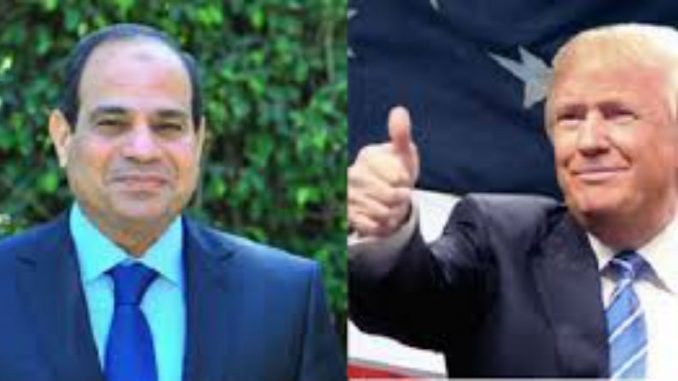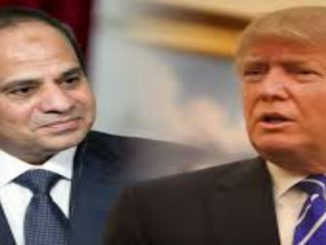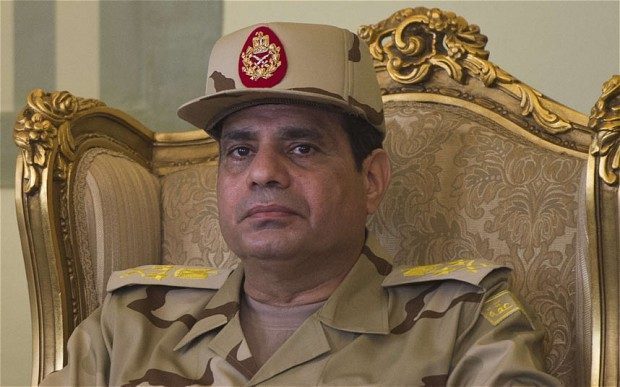
Last September, after Trump met Egypt’s military ruler in New York around the same time Hillary Clinton did, he called al- Sisi a “fantastic guy” with whom he enjoyed strong “chemistry.”
At the time, Cairo has perceived those meetings as a positive step to mend the relations with Washington that has been affected after the military coup in 2013 against Egypt’s first democratically elected president Mohamed Morsi.
The Obama administration and Congress reassessed Washington’s alliance with Egypt after the Egyptian military regime launched a massive cracked down on the Islamists — that included the bloody dispersal of Raba’a and al-Nahda sit-ins in 2013 – killing thousands at the hands of army and security forces.
As a result, the United States suspended delivery of a modest amount of military aid and rescinded a preferential form of financing that allowed Cairo to submit orders for costly items under the assumption that Congress would continue to authorize $1.3 billion in yearly military assistance aid in perpetuity.
The New York Times said in its March 14 editorial titled, ” The US shouldn’t be American Accomplice” that although “Trump drew lots of criticism during his campaign for his unceasing praise of President Vladimir Putin of Russia, however, his laudatory words for another despot, Abdel Fattah al-Sisi of Egypt , attracted less attention, though they could well signal a dangerous shift in American policy.”
“Now the Egyptian government is likely to find friendlier interlocutors in Washington. Egypt’s foreign minister, Sameh Shoukry, was in Washington recently to lay the groundwork for a visit al- Sisi is hoping to make soon,”said the NY Times.
Al-Sisi government wants to guarantee US assistance to Egypt’s recent economic reforms , to resort the financing system between both countries and to ensure that the modest amount of weapons that is still being withheld to be disbursed soon.
In fact, the new US administration may see al-Sisi as an ideal partner in fighting the Islamic State and other extremists.
It is also known that Trump opposes the attempts of change in the region known as “The Arab Spring”, tends to support stability, and is against any radical changes in the region.
In this context, Trump views war on terrorism as a top priority for US foreign policy and seeks to cooperate with authoritarian regime to achieve his goal.
Brookings institution has stated in an article “Trump’s Misdiagnosis of the Jihadists Threats” that Trump policy in the Middle East will differ from former US presidents who had a different diagnosis and thus different treatment.
“Presidents Bush and Obama believed that the lack of good governance and political freedom were the root cause of jihadism, not religion. As a result, Bush and Obama pushed for political reform in the Arab world,”said Brookings.
However, “Trump and his closest national security advisers want unconditional support for Muslim autocrats who have vowed to reform Islam to stop the violence. At the top of the list are Abdel Fatah al-Sisi in Egypt and King Abdullah in Jordan, who have both said religious reform is a necessary prelude to defeating jihadism,” according to Brookings.
In this context, the White House is reportedly considering designating the Muslim Brotherhood as a terrorist group.
In fact , although al- Sisi, a former military general, has vowed to reform Islam from within through a “religious revolution” that purges extremists,” but his tactics have been draconian and counterproductive,”said the New York Times.
The NW Times said that al-Sisi’s government has persecuted” violent and nonviolent Islamist groups with equal zeal and without due process. It has maligned and harassed human rights activists, rendering their work all but impossible. And it has smothered what remains of the political opposition. ”
Last week, Egypt’s Parliament , which has been under al-Sisi’s control, has expelled Anwar Sadat – a prominent lawmaker-who had been critical of the government’s crackdown on civil society.
The New York Times wrote, “The United States needs to be able to work with Egypt. But Washington should not make any more concessions without real reforms in Egypt’s approach to human rights and governance.”
The American newspaper also called for the release of Aya Hegazy before any talks between the two governments advance. Hegazy is an American-Egyptian humanitarian worker who has been arbitrarily detained in Cairo since 2014.
Since the military coup led by Abdel Fattah al-Sisi, the iron curtain has fallen on human rights in Egypt .
The Egyptian military regime has engaged in one of the widest arrest campaigns in the country’s modern history, targeting a broad spectrum of political opponents.
According to Human Rights Watch and local rights groups, “Between June 2013 and May 2014, the Egyptian authorities arrested or charged at least 41,000 people, and 26,000 more may have been arrested since the beginning of 2015.”
Enforced disappearance, arbitrary detention, military trials, and human rights violations at Egypt’s prisons have marked al Sisi’s reign.
The ruling places the frozen assets under government custodianship, which means that the organizations and individuals can no longer make independent decisions about the seized money.
“Donald Trump has encouraged brutal, anti-democratic leaders in the Philippines, and of course, Russia. Doing so in Egypt would fuel radicalization and discontent in the most populous nation in the Arab world,” the New York Times concluded its editorial.



